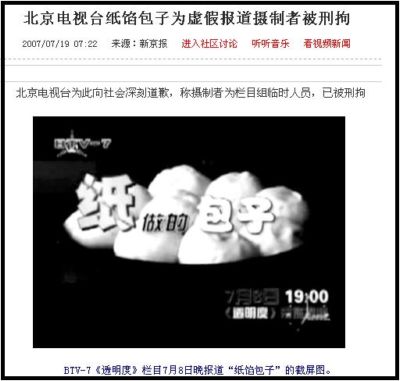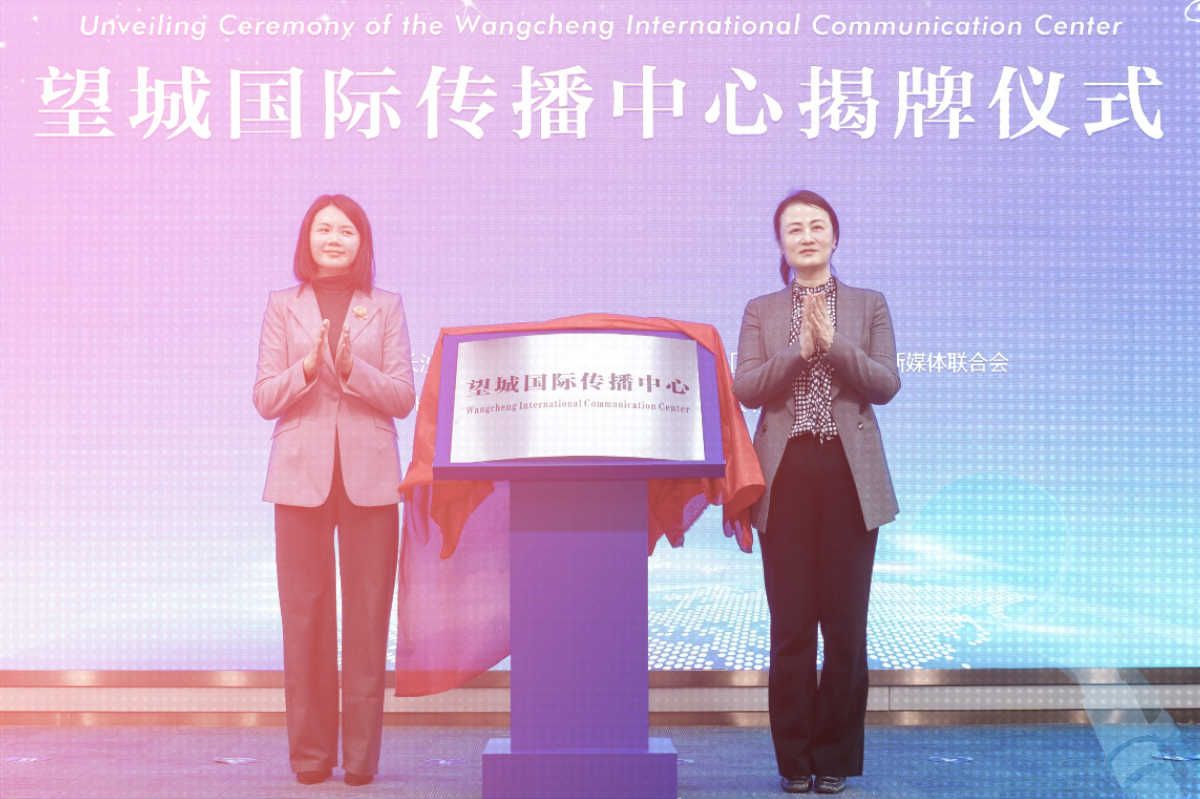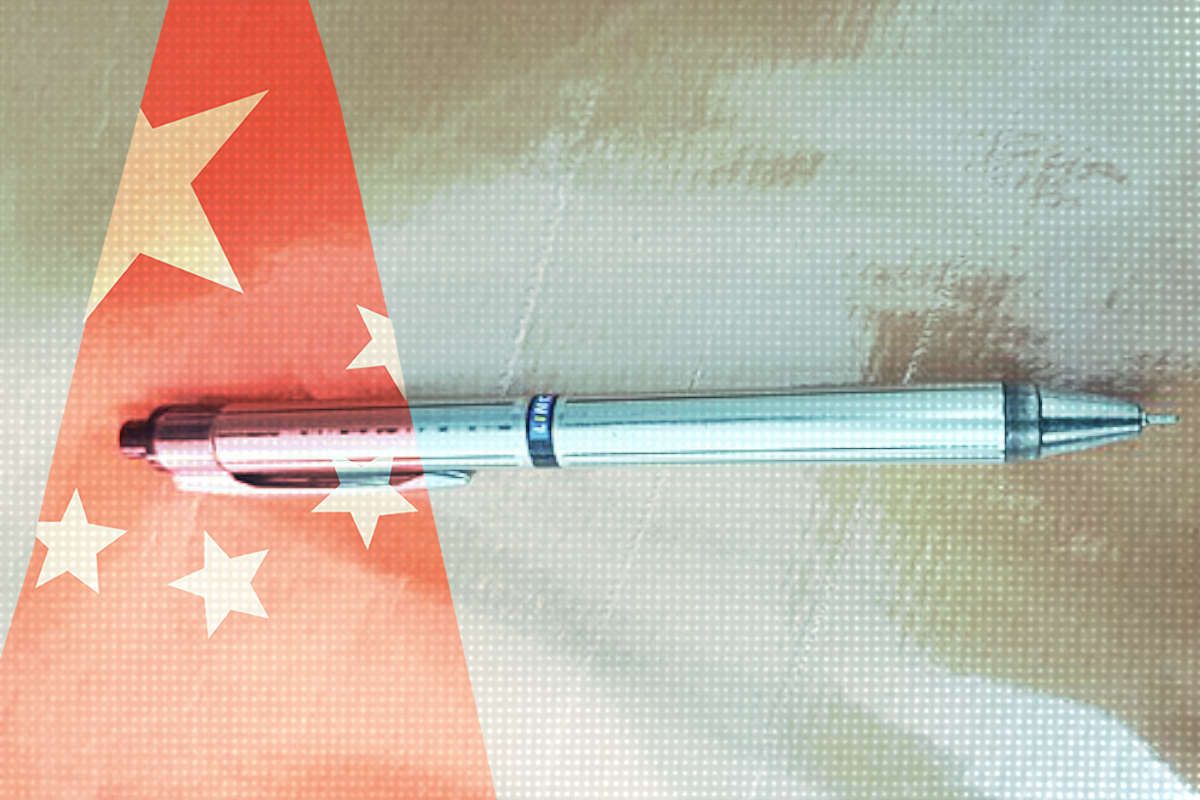Headlines and Hashtags
Southern Metropolis Daily: cardboard buns and China’s crisis of public trust
The steamed bun may now have become one of the most befitting symbols we have for the riddle of free speech and public trust in China. Almost two days after Beijing TV issued a public apology, for a “fake” July 8 report alleging food vendors in Beijing were filling steamed buns with waste cardboard, the Chinese public is still wondering who to believe. Was the news report fake, and the buns real? Or were the buns fake, the news report real, and the official police report … that’s right, fake. It’s enough to spin your head and spoil your appetite. [IMAGE: Screenshot of a Chinese news site showing the original Beijing TV ad for the July 8 “cardboard buns” spot].

The crux of the issue, Southern Metropolis Daily suggests today in its lead editorial, is a total lack of public trust in the sources of information available to them. While problems like “fake news” are endemic to Chinese news media, the public has every reason to believe, given government controls on information, that possibly, just possibly, officials have deliberately tried to discredit a story that is embarrassingly real.
The Southern Metropolis Daily editorial makes two constructive suggestions for dealing with the “suspicion, doubt and distrust” with which the public approaches news generally today. The first is allowing the press more space to monitor itself, in the spirit of the New York Times and Jayson Blair, a case to which today’s editorial refers. The second is that the government handle investigations like that into the “cardboard bun” story with greater transparency and public accountability.
A translation of the Southern Metropolis Daily editorial follows:
On July 8, “Transparency”, a problem on Beijing TV’s life channel, ran a news spot called “Cardboard dumplings.”
The report said that the [news] program has gone undercover and discovered that some people at Beijing street stalls were making steamed buns filled with waste cardboard and pork fat. After being re-run by China Central Television and other major media and websites, and garnering major and widespread attention, the story was picked up by overseas media. But 10 days later, things look very different. Yesterday, authorities in Beijing released news saying “the making of steamed buns using waste cardboard” was ‘fake news’, that a certain Zi, hired on a part-time basis by the TV station, had manufactured the news report. Beijing TV issued a solemn public apology, and the person concerned is already in criminal detention.
10 days ago, the public thought the news report was real, and that the steamed buns were fake. 10 days later, authorities announce that the news report is fake, and that the steamed buns are OK. But as to which is actually real, and which fake, people are still in a quandary. At the present time, what most infuriates the average person is that they do not have the means to pierce through the confusion.
The cardboard bun story was paraded before the world just at the time when China’s food safety crisis was playing out everywhere, and opinion in and outside [China] was unfavorable. The appearance of this egregious case again elevated the seriousness of food safety issues in China and everyone everywhere was talking about it. And when the government came out saying what we really had was fake news, that a reporter had manufactured it, many people were still willing to believe the dumplings were fake, that the news was real. Some people believed the government had looked into the case and manufactured their own version.
This cycle of distrust has seen dumplings incite a wave of opinion. It has become, in the blink of an eye, an exercise in which the public tests its wits trying to separate out fact and fiction …
This confusing state of affairs is cause for distress. Surrounding this back and forth over cardboard dumplings is a worsening food crisis, and a crisis of credibility among media and journalists. There is also the problem of government controls on the media. The snowballing of case after case provides the backdrop for the public mindset. Suspicion, doubt, distrust, have become the scalpels with which the public dissects public events.
Waste cardboard to fill dumplings, and then, in the blink of an eye, fake news. So the affair has ended with the criminal detention of a program editor who manufactured [a story], but no one, not those running street stalls, not the news media, not the government, can escape the stink. The distrust so prevalent in society lately has upset the natural death of this affair [that might come with the news of the journalist’s exposure and detention]. The public distrusts those running the street stalls. They distrust the news media. They distrust the local government that dealt with the affair. In order to avoid the dispute and put to rest the suspicions of the public, many aspects of the handling of the affair might have been improved.
As for media discipline, things were in this case almost entirely through administrative means [by the government], and there was little room for monitoring within the media. The affair played out quickly, and its influence was huge. Government power was marshaled quickly, and the media were merely supporting characters in the event’s handling, playing an extremely passive role. In fact, where fake news reports are concerned, there should first be a respect for the media’s role in exercising its own self-discipline.
In April 2003 the New York Times also had a scandal over a journalist fabricating news. After it learned a reporter might be fabricating [stories], the Times assigned five reporters, two researchers and three editors to investigate. They carried out over 150 conversations, eventually giving front page play to a lengthy expose, apologizing to readers and employees at the paper. In the cardboard dumpling case, the government and the police became immediately involved … Before the media’s own self-check mechanism had no time to kick in, the government has given its conclusion, and this process was insufficiently transparent. These are all areas where the handling of the affair was careless and inconsiderate.
[Posted by David Bandurski, July 20, 2007, 4:42pm]





















